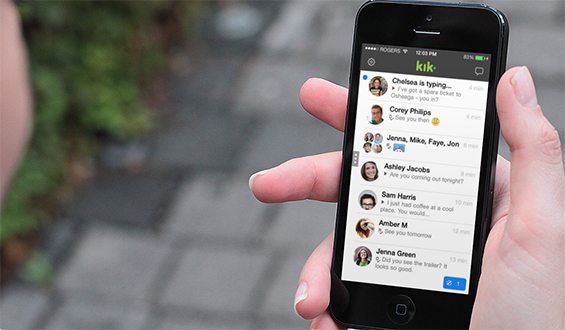
Teenagers are beginning to move from social media sites to smartphone messaging apps, which means they can have practically complete privacy while participating in their online social world.
Popular apps include Kik, Whisper, WhatsApp, Ask.fm, and Line, some of which can be used while the user remains anonymous. That means no parental controls, and, at least when using Snapchat, automatic erasure of inappropriate pictures, reports Michael S. Rosenwald of the Chicago Tribune.
So many parents are less knowledgeable about technology than their children that parental monitoring of these apps would be difficult even if the programs were not anonymous. On the other hand, advertisers are being given an enormous opportunity. Marketers are watching the youngsters’ online interaction and using any information they can get for their benefit.
Line, a texting app created in Japan after a disastrous earthquake, is gaining members in the US by selling animated digital stickers of characters like Darth Vader or Snoopy. The idea is to make the teens’ chatting even more fun through the use of cute dancing stickers. And on Kik, advertisers text with teens using bots.
“It’s fascinating,” said Catherine Boyle, an analyst with eMarketer. “These messaging apps present very different ways for brands to engage with younger consumers. Banner ads are never going to work. Branded bots are a really clever way to let brands offer a more natural presence of themselves.”
But Kik executives say their company is modeling WeChat, a messaging app from China with almost 700 million users who make purchases and pay bills by using their service. Executives say they envision a time when Kik users will chat with bots that assist them in buying products directly from their app.
Experts advise parents to put limits on what can happen on these apps and create enough trust and communication that teens will be willing to speak up if dark paths open up. Those in the know say that using these apps is much the same as building your kids judgment and responsibility to the point where they can, for example, visit a shopping mall by themselves safely.
Catherine Steiner-Adair, a Boston-area psychologist and author of “The Big Disconnect: Protecting Childhood and Family Relationships in the Digital Age,” said:
“What happens on these apps isn’t public, which is why the kids like them. There are no parents around. There are no teachers around.”
Being out of the parental spotlight can be positive in some ways, she adds, but tricky for parents at the same time.
After a 13-year-old girl was allegedly kidnapped and killed by two Virginia Tech freshmen, authorities say she had communicated with a man online. The method by which they met was Kik, and that has become a reason for extreme concern for those in the law enforcement realm, write Sheryl Gay Stolberg and Richard Perez-Pena, reporting for The New York Times.
Nicole Madison Lovell’s January death has put Kik in the spotlight for all the wrong reasons. Police officials say the app has been connected to an increasing number of cases of abuse. The day before Nicole died, she shared messages with some of her neighbors from an 18-year-old man she was going to meet.
Kik joined with the FBI to gather the needed information to arrest David Eisenhauer, 18, and Natalie Marie Keepers, 19, both aspiring engineers. But Kik is being used by 40% of US teens, says the company, and the app goes much further than other messaging apps to hide its users from view. Still, there are many such apps available to young people.
Online communication opportunities surround kids, and there is no question that they enhance young people’s social circles. But they have also been used to threaten, “sext,” and intimidate. The smartphone era means a child has a computer in his or her pocket constantly, says The Roanoke Times’ Ralph Berrier, Jr.
Nancy Hans, director of the Prevention Council of Roanoke Valley, Virginia, says parents need to set boundaries, know the technology, set clear rules, be good models — and be the adult rather than the “best friend.”




